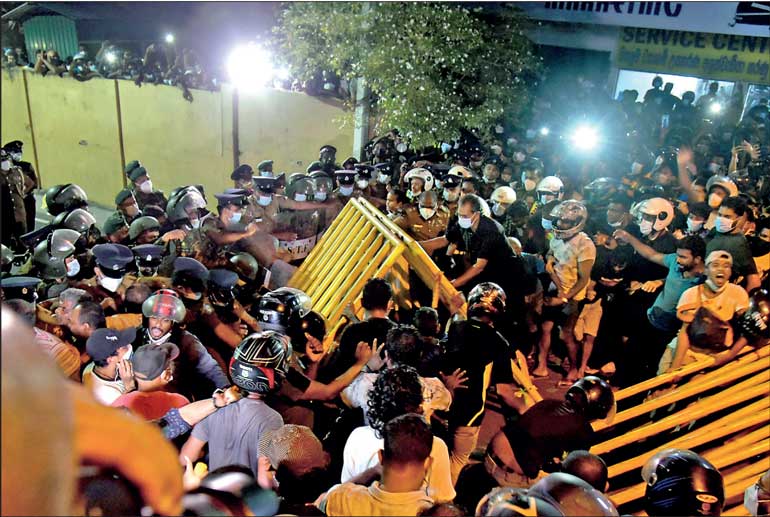Monday Feb 23, 2026
Monday Feb 23, 2026
Saturday, 9 April 2022 00:35 - - {{hitsCtrl.values.hits}}

STANDING – and withstanding
 Like never before, politics as it is practised in Sri Lanka has come under scrutiny by virtually all its stakeholders acting at the same time.
Like never before, politics as it is practised in Sri Lanka has come under scrutiny by virtually all its stakeholders acting at the same time.
What began in a darkened suburb as a candlelit protest against untenable power outages has brought a plethora of grievances into the light through a panoply of demos, marches, rallies, and sundry civil society agitations.
Glad it hasn’t come to sit-ins – yet.
Have an eye open for agents provocateurs of any persuasion – apolitical as they may be if they are armed thugs operating incognito – and how a peaceful protest can turn violent at the drop of a dirty word.
Good to keep in mind that though curfews, social-media embargos and spurious gazetting of emergencies may be over, there are more martial agencies at work that could instrumentalise crackdown yet, which none of us could countenance or contain.
That a cross section of demographics across the island has ‘voted with their feet’ should suffice to dispel the dismissive observation in Parliament by a ruling party member that this is a protest of mere thousands to hold 22+ million people hostage.
When the go-slows, work-to-rules and other interventions of the self-identifying ‘labour class’ kicks in after April 8 – as announced by the TUCC – that MP may have only his word to eat.
Then there is the dreaded ‘long march’ of starving farmers shut out of their means of production, distribution and consumption.
That – if it grows organically again in the periphery, and not by dint of the political opposition’s weaponisation of agricultural sector protests as in the recent months past – may well mean we will all have nothing to eat. There’s no money in state coffers beyond April’s end (the cruellest month) for fuel, food and pharmaceuticals anyway. So no rush, ye MPs and other sainted governors of ours... is there?
Thus the mostly hot air spouted – interspersed by a few ideas of substance being vocalised – in Parliament over the past few days must be condemned for its focus on the survival of the parliamentary system in general and several of its members in particular. Not the people! Never the people! So it would seem?
Care must be taken – however disgruntled we may be with certain self-serving legislators – not to cavalierly dismiss ‘all 225’ of them out of hand.
That would be playing into the hands of those who may want a more extreme ‘final solution’ to civic agitation while satisfying the more naive interpretations of the body politic. Which are evident on street placards as much as in social-media posts.
This may well be the end-game that those who stubbornly refuse to ‘go home’ could be counting on.
That a tone-deaf executive has ignored all the writings on the wall – from insolent hash-tags standing out like a sore thumb, to intrepid lawyers standing up for those arrested for exercising their civil rights – must be cause for concern as well as a clarion call to proceed with caution.
That said, the developments of the past few days has shown that there is both hope for cautious optimism that civil society as a whole is on the right track in the face of an abysmal political culture. As well as that Sri Lanka is on a dangerous and difficult trajectory that needs much thought and reflection in addition to tough decisions to be made to avert a larger disaster than the ransoming of democracy.
Here in my book are three areas to think about:
The constitutional
A clarion call in terms of political trends in these trying times has been threefold:
a. Abolish the Executive Presidency
b. Repeal the 20th Amendment
c. Rid Parliament of all 225 MPs
I give you the end of a golden thread – now, wind it into a ball... because there’s only one way discernible in which the polity can move that is both constitutional and honours all the manifest wishes of the people, as expressed so many times in a host of ways and hast-tags.
First, sufficient pressure should be exerted on the SLPP and its coalition’s MPs to leave Government and sit – not independently, where they can vacillate and vote at will, but – with the government.
When the 145-seat Government loses its majority (113), pressure could be exerted on the President to resign – by the Members of Parliament as much as the public all over again.
If the executive still won’t “go home”, a more united Parliament could initiate impeachment proceedings – of course, this would likely be a lengthy process because it requires a 2/3rds majority to succeed.
If the Head of State steps down, the House can appoint someone from among its number (225) to serve as President for the rest of the former incumbent’s term. (In the alternative, there is an opportunity to usher in someone from outsider ranks using any party’s national list... if one MP resigns in order to give effect to this...)
Until the horse-trading and other hand-wringing and finger-pointing is done, the Prime Minister or Speaker could stand in as Acting President.
Once a new Head of State is elected by Parliament, two scenarios could ensue. Either the country at large proceeds to negotiate with the IMF under a new government, which may well be a coalition after the political negotiations are done. Or the sitting House could table a bill leading to the abolition of the Executive Presidency straight away... the much vaunted system change that successive campaigns have promised; but which have eluded the people from CBK through MR to MS/RW and GR.
If and when the Executive Presidency is abolished, we could have a nominal/symbolic Head of State – who knows, in an all-new Sri Lanka it could be a young woman from a minority community... to break completely with the past?
Now power will be back with Parliament, which may well be unpopular with those calling for all 225 to resign. Thus it would be paramount to have a Prime Minister who is well and truly ‘primus inter pares’ (‘first among equals’) – and not some latent national saviour with a messiah complex all over again.
With such a system in place in the short term, the governors of fiscal and monetary policy institutions together with the legislature and executive working in tandem could address the ‘economic crisis’ with fresh vigour.
In 2025, last not least, there will be scheduled elections – and then, but not now, the sovereign people would have an opportunity to vote in a whole new ethic of lawmakers.
And then, but not as now, the sovereign people will have an opportunity to remind themselves of Orwell’s prophetic warning: “A people that elect corrupt politicians, impostors, thieves and traitors are not victims – but accomplices.”
The man, woman and child (yea, out of the mouths of babes too has come perfect praise for a clean society and condemnation for chicanery and sleaze) in the street today would add ‘chauvinists’ and ‘charlatans’ to the list.
The societal
Only time will tell if the seismic shifts across diverse demographics will draw society along a new fault line. In the past, we islanders have managed to divide and conquer ourselves along political (blue/green/red), geographical (north/south), ethno-linguistic (S/T/E), socio-economic (haves and have-nots) and class (bourgeoisie/proletariat) lines.
On the way forward, at least some of the artificial and assigned differences might melt away, and smelt out of a felt humanity a sublime island race of which we can all be part and proud of. And subscribe to sans hesitation. Out of the crucible of our present, shared suffering can – and must – come a new ethos... if the price paid and sacrifices made so far are to mean anything.
The economical
It is a matter of record now that the incumbent administration did not heed an abundance of warnings about the seriousness of the crisis that was bound to come if it pursued its heedless path.
These cavalier approaches by dint of which professional, expert, informed advice was disregarded is costing the country dearly in terms of an immediate price to pay. As well as heaping coals on inflamed heads.
Surely the worst is yet to come, and there is cold comfort from think tanks even now, in their assurance that things will get a lot worse before it begins to get better.
The needs of the hour to stave off both balance of payments related as well as banking sector crises are to secure bridging finance from friendly nations, restructure national debt and deploy social security schemes to safeguard vulnerable groups. Food, power and medicines top the list of essentials for which forex or revenue or both are needed, in order to stave off an ‘Economic Armageddon’ – if, in fact, the last trump has not already sounded; and we’re heading into the abyss of default, bankruptcy and abject penury.
Should the political opposition have any aces up their sleeves, it’s time to play them in public now. If the people see merit in the same, so much the better for anyone’s future chances at winning back the people’s confidence at a ballot that must come ahead of any bullets being fired at a citizenry desperate to live. And if even now, the government will miraculously grow less arrogant overnight, there may be a glimmer of hope for a nation on the edge...
Curfews, emergencies, social media blockades and attendant political unrest – fuelled by political mismanagement, arrogance and truculence in the face of a widespread popular uprising – have done enough damage to the national interest, country image, GSP+ prospects et al.
Time to talk turkey – or truss it and shove it in the ‘no-confidence motion’ oven... if ‘gobble-gobble’ won’t back down or bow out? Time to talk to the IMF... if they will still parley and parlay – after all the instability we’ve managed to communicate. Time to get tough and hang tough, people and politicians of Sri Lanka! Time... is running – out.
Editor-at-large of LMD | Ethics over realpolitik |